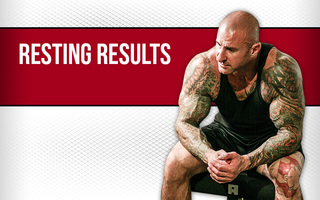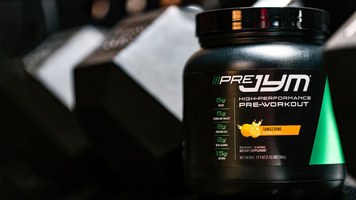Jim Stoppani Vitamin D
Have you ever looked at the Supplement Facts panel of your multivitamin? If so, does it contain all of the vitamins and minerals your body needs to perform and function optimally?
You'd probably like to answer "yes," but contradictory as this may sound, the better answer is, "It contains almost all of them, but not quite."
If you're wondering why you would possibly want an "incomplete" multivitamin, here's the reason: Because there are five vitamins and minerals in particular that, if included in your multivitamin/multimineral supplement, will compete with the uptake of one another as well as with other key minerals included in that multivitamin (like iron, copper, and manganese). Your body needs all five of them – just at different times.
The five micronutrients I'm talking about are:
- Zinc
- Magnesium
- Calcium
- Vitamin D
- Phosphorous
If the multivitamin you use contains any of these five vitamins and minerals (and most multis on the market do), you have a problem. Vita JYM, my best-selling multivitamin product, contains none of the five. That's why it's the multi of choice for hard-training men and women who want to optimize performance, maximize results, and improve overall health.
But don't just take my word for it. Below, I explain the science behind why each of the five vitamins and minerals should be absent from your multivitamin.
1) Zinc and 2) Magnesium
I'm covering the first two together since they go hand-in-hand. Make sure your multivitamin is free of both zinc and magnesium. It's not that you don't need these essential minerals; you do need them, but you don't want them in the mix with the other vitamins and minerals you're taking. If zinc and magnesium are present in your multivitamin, their uptake by the body will be limited, as will numerous other micronutrients in that supplement (like copper, which research has shown competes with zinc for absorption).
Plus, it's much better to take zinc and magnesium without food – typically before bedtime, to take advantage of the stress-reducing, sleep-promoting benefits of magnesium (as found in this study). Multivitamins, as you may know, are best taken with meals, so you can see the contradiction of having zinc and magnesium included. These two minerals really should come from a different supplement: namely, ZMA JYM.
I designed Vita JYM and ZMA JYM to work together. ZMA JYM provides the zinc and magnesium that were purposely left out of Vita JYM. If you're really serious about your gains, you'll want to maximize your uptake of zinc and magnesium. Both have been found to be critical for maintaining testosterone levels; increasing muscle strength, endurance, and growth; enhancing immune function, and boosting metabolism.
Also, consider the fact that hard-training individuals are often deficient in zinc and magnesium, due to the loss of these minerals through sweat and urine and the increased use of them during protein synthesis and recovery. If you train, chances are you have a greater need for zinc and magnesium than someone who's sedentary.
The best way to address this need and maximize zinc and magnesium uptake (aside from taking them separate from your multivitamin) is by taking the chelated forms of these minerals, as found in ZMA JYM. Chelated minerals are ones that are combined with other compounds (like amino acids) to enhance absorption in the body. Research has shown that chelated zinc-magnesium supplements (ZMA) increase strength, insulin-like growth factor I (IGF-I), and both free and total testosterone levels in athletes.
The lesson learned here is that certain key minerals should not be in your multivitamin, yet you need to make sure you get them elsewhere. The same holds true for the next micronutrient on our list…
3) Calcium
Look again at the Supplement Facts panel of your multivitamin, and make sure that calcium is NOT listed.
First of all, calcium interferes with the uptake of zinc, iron, and manganese. But more importantly, it may also be harmful to you in certain supplemental forms. Science has long been chasing the cardiovascular and fat-melting benefits of calcium from naturally occurring dairy sources, and there's a lot of research backing these benefits.
However, supplemental, non-naturally occurring forms of calcium, like calcium citrate and calcium carbonate, seem to have the opposite effect. Not only have they failed to show true benefits in clinical studies (particularly for fat loss), but there's evidence that these non-dairy forms of calcium may increase the risk of heart disease and health conditions like kidney issues and possibly even cancer.
So, where should you get your calcium? From real dairy, that's where – milk, cottage cheese, yogurt, etc. But you can also get your calcium in supplemental form via protein powder, as long as it's from a naturally occurring dairy source like my Pro JYM protein blend is.
All flavors of Pro JYM provide over 400 mg of calcium from milk (real dairy) in every scoop. That way, you reap all the benefits of naturally occurring calcium from dairy without any of the potential harm.
4) Vitamin D
After calcium, check your multivitamin label for Vitamin D. Hopefully, it's not on there.
Vitamin D provides numerous health- and muscle-boosting benefits, including enhanced brain health, bone health, mood, and strength. But it's not in Vita JYM. Why not? A few reasons…
First of all, it's fat-soluble (as opposed to water-soluble) – meaning, it can be stored in the body, specifically in the fat cells, at toxic levels. Because of its benefits, it's been a highly promoted supplement, and research has shown an uptick of vitamin D toxicity in the last decade or so. Vitamin D toxicity can cause vomiting, dehydration, loss of appetite, bone pain, and kidney problems. So, you do NOT want to take your vitamin D every day you take your multivitamin.
The best way to get vitamin D is through your skin from the sun. (And don't worry, you will not get vitamin D toxicity through the sun; your body regulates vitamin D from sun exposure.) If you live where there's little sunlight for part of the year, use a sun lamp or take a vitamin D3 supplement. But even then, you should only be taking the vitamin D supplement during that short period, not every single day in your multivitamin!
5) Phosphorus
Last, check for phosphorus, a mineral found in your bones that, along with calcium, supports bone health along with other health benefits. Phosphorus is the second-most abundant mineral in the body (behind calcium).
Yes, phosphorus is an essential nutrient that your body needs. But it should be absent from your multivitamin because, in developed countries like the United States, we generally get far too much of it in our diets. Many high-protein foods (including beef, poultry, fish, dairy, and eggs) contain phosphorus, as do items like whole grains and potatoes and many processed foods. Thus, supplementing with it could lead to overly high levels, which recent research shows could have detrimental health effects.
One problem with excess phosphorus is that it can interfere with vitamin D's activation to its active form, which provides all of its benefits in the body. Research has found that too much phosphorus can also negatively affect your body's uptake of iron, calcium, magnesium, and zinc, and it can lead to kidney and cardiovascular problems, as well as bone issues.
The Bottom Line on Choosing a Multivitamin
Instead of looking for a multivitamin that has EVERYTHING, start looking for one that has almost everything you need, leaving out calcium, zinc, magnesium, vitamin D, and phosphorous – like Vita JYM. It's the only way to optimize the uptake of all the nutrients your hard-training body needs for maximal results!
References
Brilla, L. R., and Victor Conte. "Effects of a Novel Zinc-Magnesium Formulation on Hormones and Strength." Journal of Exercise Physiology Online 3.4 (2000).
Chang AR, Anderson C. Dietary Phosphorus Intake and the Kidney. Annu Rev Nutr. 2017;37:321-346. doi:10.1146/annurev-nutr-071816-064607
Cinar V, Polat Y, Baltaci AK, Mogulkoc R. Effects of magnesium supplementation on testosterone levels of athletes and sedentary subjects at rest and after exhaustion. Biol Trace Elem Res. 2011;140(1):18-23. doi:10.1007/s12011-010-8676-3
Galior K, Grebe S, Singh R. Development of Vitamin D Toxicity from Overcorrection of Vitamin D Deficiency: A Review of Case Reports. Nutrients. 2018;10(8):953. Published 2018 Jul 24. doi:10.3390/nu10080953
Krotkiewski M, Gudmundsson M, Backström P, Mandroukas K. Zinc and muscle strength and endurance. Acta Physiol Scand. 1982;116(3):309-311. doi:10.1111/j.1748-1716.1982.tb07146.x
Prasad AS, Mantzoros CS, Beck FW, Hess JW, Brewer GJ. Zinc status and serum testosterone levels of healthy adults. Nutrition. 1996;12(5):344-348. doi:10.1016/s0899-9007(96)80058-x
Tankeu AT, Ndip Agbor V, Noubiap JJ. Calcium supplementation and cardiovascular risk: A rising concern. J Clin Hypertens (Greenwich). 2017;19(6):640-646. doi:10.1111/jch.13010
Taylor PN, Davies JS. A review of the growing risk of vitamin D toxicity from inappropriate practice. Br J Clin Pharmacol. 2018;84(6):1121-1127. doi:10.1111/bcp.13573
Wapnir RA, Lee SY. Dietary regulation of copper absorption and storage in rats: effects of sodium, zinc and histidine-zinc. J Am Coll Nutr. 1993;12(6):714-719. doi:10.1080/07315724.1993.10718364
Wienecke E, Nolden C. Langzeit-HRV-Analyse zeigt Stressreduktion durch Magnesiumzufuhr [Long-term HRV analysis shows stress reduction by magnesium intake]. MMW Fortschr Med. 2016;158(Suppl 6):12-16. doi:10.1007/s15006-016-9054-7
Related Articles
-

8 Weeks to Boulder Shoulders
Training
Having well defined shoulders isnt easy...Having Boulder Sized Shoulders is difficult.
-

Top Triceps
Training
Keep your Triceps in TOP condition with this routine
-

Resting Results
Training
More reps burns more calories? Maybe. The Doc Answers this and much More!!
-

Alpha-GPC
Supplements
Whats the Benefit of A-GPC? Find out exactly what it is.
Source: https://www.jimstoppani.com/supplements/5-things-that-better-not-be-in-your-multivitamin



0 Komentar